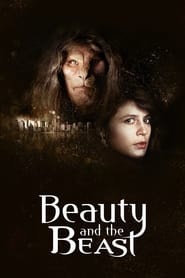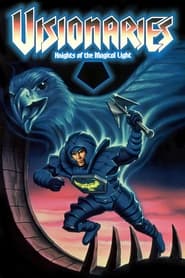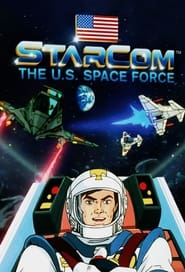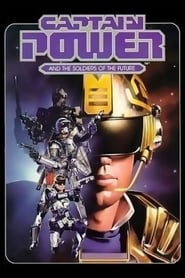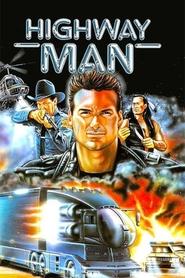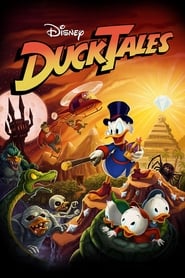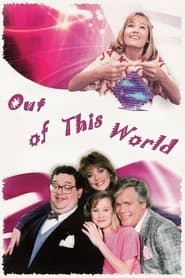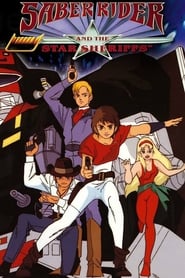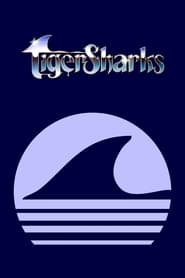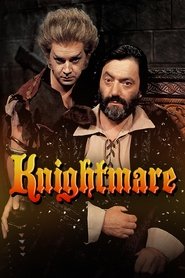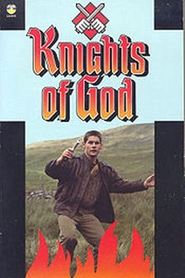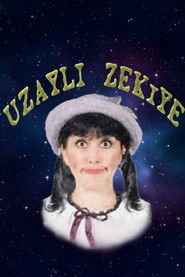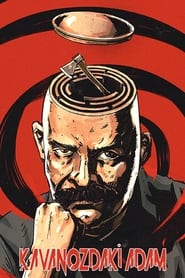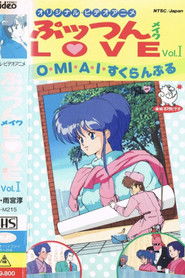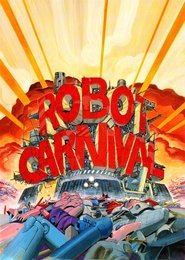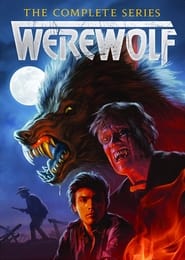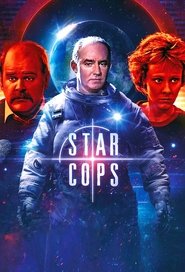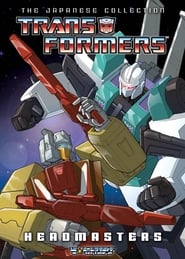New Sci Fi Fantasy TV Series on Tub Tv - Page 378
-
Beauty and the Beast
1987
Beauty and the Beast
1987
star 7.4Beauty and the Beast is an American drama series which first aired on CBS in 1987. Creator Ron Koslow's updated version of the fairy tale has a double focus: the relationship between Vincent, a mythic, noble man-beast, and Catherine, a savvy Assistant District Attorney in New York; and a secret Utopian community of social outcasts living in a subterranean sanctuary. Through an empathetic bond, Vincent senses Catherine's emotions, and becomes her guardian. -
Visionaries: Knights of the Magical Light
1987
star 7The planet Prysmos suffers a collapse of its high-tech civilization due to a solar re-alignment. Two groups rise to dominance from the devastation to wage war upon each other. One is controlled by honest and law-abiding people and the other by criminals and villains. Following an open challenge thrown down by the great wizard Merklynn, fourteen surviving knights are granted powers of transformation and magical energy. The groups are now divided between the good Spectral Knights and the evil Darkling Lords. The battle for supremacy begins... -
Starcom: The U.S. Space Force
1987
star 7Starcom: The U.S. Space Force is an animated syndicated series in the 1980s that spawned a successful motorized toy line franchise in Europe and Asia for Mattel, despite its failures to succeed in its U.S. domestic market. The plot was based on the adventures of an American astronaut brigade as they fought off attempted invasions by Shadow Force, a nasty collection of aliens and robots led by the nefarious Emperor Dark. The show was developed with the help of the Young Astronauts’ Council with the original intention of sparking young viewers’ interest in the U.S. NASA Space Program. However, Starcom did not get much of a chance to make kids want to join the space program as it was cancelled off the air after one brief season. It was revived for a short run in the early 1990s, but no new episodes were aired. It was produced by DiC Enterprises and distributed by Access Syndication. The plot was classic Flash Gordon and Buck Rogers fare. The evil members of Shadow Force, led by Emperor Dark, were trying -
Captain Power and the Soldiers of the Future
1987
star 7.4Captain Power and the Soldiers of the Future is a 1987–88 Canadian-American science fiction/action television series, merging live action with animation based on computer-generated images, that ran for 22 episodes in Canadian and American syndication. -
The Highwayman
1987
-
DuckTales
1987
DuckTales
1987
star 7.7Scrooge McDuck finds his hands full at home when nephews Huey, Dewey and Louie move to Duckburg. Joined by their loyal pals Launchpad McQuack, Gyro Gearloose and Mrs. Beakley, the DuckTales gang never fails to deliver a wealth of adventure. Get ready for a fortune of fun with DuckTales! -
Out of This World
1987
Out of This World
1987
star 7.3Out Of This World is an American fantasy sitcom about a teenage girl who is half alien, which gives her unique supernatural powers. It first aired in syndication from September 17, 1987 and ended on May 25, 1991. During its first season, the series was originally part of NBC's Prime Time Begins at 7:30 campaign, in which the network's owned-and-operated stations would run first-run sitcoms in the 7:30-8 pm time slot to counterprogram competing stations' game shows, sitcom reruns and other offerings. Out of This World was rotated with the original series Marblehead Manor and She's the Sheriff, a syndicated revival of the 1983 sitcom We Got It Made, and a television adaptation of the play You Can't Take It With You. NBC ended the experiment after the 1987-88 season due to the low ratings put up by three of the series, with Out of This World being one of the two that was renewed. After its first season the series was largely moved to weekend time slots, where it remained until its cancellation following the fourth se -
Saber Rider and the Star Sheriffs
1987
star 8.1In the distant future, humanity has colonized the stars. To maintain peace and order across mankind's New Frontier, Earth's Cavalry Command develops the "Ramrod Equalizer Unit", a transforming battleship operated by their elite unit of special operatives, the Star Sheriffs, to defend the settlers of the galaxy. Their biggest threat? The Outriders, a group of extra-dimensional beings that intend to conquer our dimension and enslave humanity with their superior technology and weaponry. Armed with their wits, courage, and of course, Ramrod, it's up to Saber Rider and his team to stop the Outriders once and for all and bring peace to the universe! -
TigerSharks
1987
TigerSharks
1987
star 5TigerSharks is an American animated children's television series developed by Rankin/Bass and distributed by Lorimar-Telepictures in 1987. The series involved a team of heroes that could transform into sharks and other marine animals and resembled the series ThunderCats and SilverHawks, also developed by Rankin/Bass. The series lasted only one season with 26 episodes and was part of The Comic Strip show, which consisted of four animated shorts: TigerSharks, Street Frogs, The Mini Monsters, and Karate Kat. The animation was provided by Pacific Animation Corporation. Warner Bros. Animation currently owns the series, as they own the 1974-89 Rankin/Bass library, which was incorporated into the merger of Lorimar-Telepictures and Warner Bros. -
Knightmare
1987
Knightmare
1987
star 8.4Knightmare is a British television programme for children and was broadcast on CITV from 7 September 1987 to 11 November 1994. An adventure game show, Knightmare involves a team of four children – one taking the role of the sightless dungeoneer, and the remaining three acting as their guide – traversing a medieval environment as they attempt to complete a quest and exit the dungeon, using their wits to overcome puzzles, obstacles and the unusual characters they meet along the journey. The show is most noted for its use of blue screen chroma key and use of 'virtual reality' interactive gameplay on television. Broadcast to high viewing figures throughout its original run, it has garnered a cult status amongst its fans since its final television episode in 1994. It was revived for a one off special by YouTube in August 2013. -
Knights of God
1987
Knights of God
1987
star 5Knights of God was a British science fiction children's television serial, produced by TVS and first broadcast on ITV in 1987. It was written by Richard Cooper, who had previously worked in both children's and adult television drama. In 2020, Britain is ruled by the Knights of God, a fascist religious order – founded by the Prior Mordrin – that came to power during a brutal civil war that began in 2000, during which the Royal Family were supposedly all slaughtered by Brother Hugo and the civilian government collapsed, leaving the Knights free to step into the power vacuum. -
Uzaylı Zekiye
1987
-
The Man in the Jar
1987
The Man in the Jar
1987
star 7Famous writer Semih Serifoglu has a brain transplant. Then, his body and brain begin get to work separate from each other. -
凶靈大法師
1987
-
Puttsun Make LOVE
1987
-
Robot Carnival
1987
Robot Carnival
1987
star 6.7An anthology of various tales with robots being the one common element among them. It consists of nine shorts by different well-known directors, many of whom started out as animators with little to no directing experience. Each has a distinctive animation style and story ranging from comedic to dramatic story lines. -
Werewolf
1987
Werewolf
1987
star 8.6Eric Cord, a college student transformed into a werewolf undergoes a quest to rid himself of his curse by killing the apparent originator of his 'bloodline'. -
Star Cops
1987
Star Cops
1987
star 5.7Star Cops is a British science fiction TV series created by Chris Boucher, set in 2027 where the International Space Police Force (ISPF) maintains law and order in a newly colonized solar system, overseen by Commander Nathan Spring. Known for its hard science fiction approach and realistic portrayal of space travel, the series was canceled after one season due to poor ratings and production issues. Retrospectively, it has been critically reappraised. -
Transformers: The Headmasters
1987
star 7.7Following on The Return of Optimus Prime (and in place of The Rebirth), The Headmasters is the first Japanese-exclusive Transformers franchise. -
My Name is Jimmy
1987
My Name is Jimmy
1987
A family series about a group of children who suddenly find a robot called Jimmy.
 Netflix
Netflix
 Amazon Prime Video
Amazon Prime Video
 Apple iTunes
Apple iTunes
 Apple TV Plus
Apple TV Plus
 Disney Plus
Disney Plus
 Google Play Movies
Google Play Movies
 Paramount Plus
Paramount Plus
 Hulu
Hulu
 HBO Max
HBO Max
 YouTube
YouTube
 fuboTV
fuboTV
 Peacock
Peacock
 Peacock Premium
Peacock Premium
 Amazon Video
Amazon Video
 The Roku Channel
The Roku Channel
 AMC+
AMC+
 Kocowa
Kocowa
 Hoopla
Hoopla
 The CW
The CW
 Vudu
Vudu
 Starz
Starz
 Showtime
Showtime
 PBS
PBS
 Pantaflix
Pantaflix
 FXNow
FXNow
 Tubi TV
Tubi TV
 Kanopy
Kanopy
 Comedy Central
Comedy Central
 Crunchyroll
Crunchyroll
 Microsoft Store
Microsoft Store
 Redbox
Redbox
 Sun Nxt
Sun Nxt
 ABC
ABC
 DIRECTV
DIRECTV
 Crackle
Crackle
 Fandor
Fandor
 Plex
Plex
